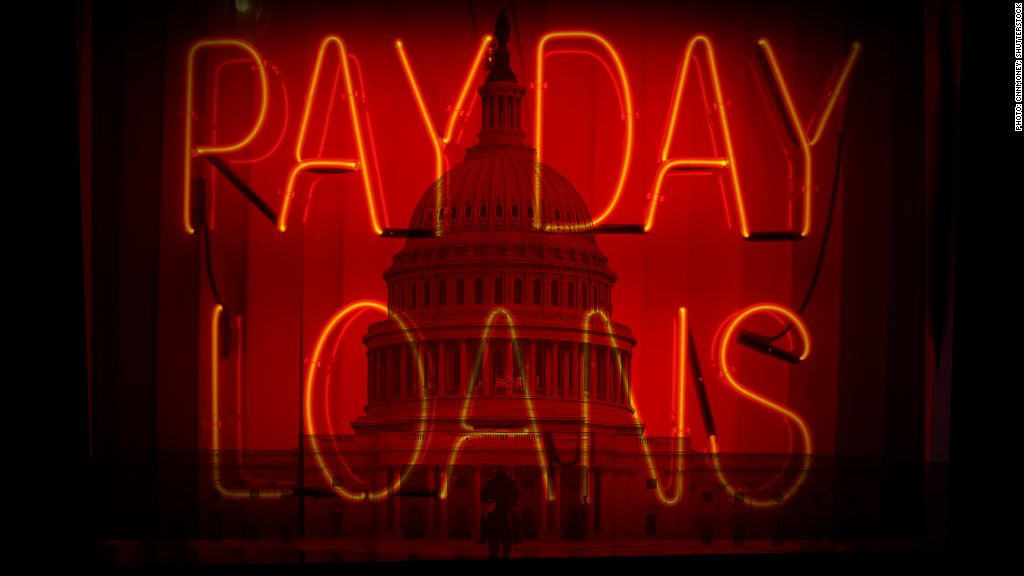
Payday lenders are spending millions of dollars in Washington in an attempt to stop the government from cracking down on the industry.
And it appears to be working.
Since the beginning of 2013, high-cost loan providers and those with ties to the industry have spent more than $13 million on lobbying and campaign donations to at least 50 lawmakers, according to a new report from the nonprofit Americans for Financial Reform.
Recipients include big names on both sides of the aisle, like House Speaker John Boehner and Democrat Debbie Wasserman Schultz, though lesser-known lawmakers received some of the biggest contributions.
One major lender, Cash America International (CSH), has spent nearly $1.8 million on lobbying efforts and donations. Meanwhile, a leading trade group, the Online Lenders Alliance, has spent another $1.8 million, which it told CNNMoney is part of its "federal outreach [to] educate policymakers."
All of this money has been pouring in as consumer groups and federal regulators have ramped up scrutiny of short-term, high-cost loans, like payday loans -- which are infamous for carrying fees that translate into triple-digit interest rates and trapping consumers in cycles of debt.
Related: Payday loan borrowers pay more in fees than original loan
Last year, the Department of Justice launched "Operation Choke Point," an initiative aimed at cracking down on banks that do business with fraudulent companies, including payday lenders that break state or federal laws.
The payday lending industry argues that the crackdown is unfair and that even legal operators are targeted as part of the initiative. The government is "bullying banks into choking off legal businesses because they simply didn't like the industry," Online Lenders Alliance said in a recent statement.
The Consumer Financial Protection Bureau has also started taking enforcement actions against payday lenders. And next year, the consumer watchdog is expected to announce a variety of new rules for the industry.
To get the government off their backs, these "quick-fix consumer lenders" are attempting to cash in on the "$13 million tab" they've built up through lobbying and campaign contributions over the last two years, says Gynnie Robnett, campaign director at AFR and one of the report's authors.
The Online Lenders Alliance, for example, has ramped up its lobbying efforts significantly. Between 2012 and 2013, its spending jumped more than 40%, according to lobbying records.
"They have no problem using the money they make off of vulnerable cash-strapped consumers to curry favor in D.C.," said Robnett.
Related: Debt collection horror stories
The report found at least 50 lawmakers, political parties and committees who have received campaign contributions from payday lending industry groups and companies.
While any amount of lobbying or donations from a controversial industry can prompt questions of influence, these politicians raise million of dollars each election from a variety of sources, so contributions from payday lenders represent a small fraction.
Republican Jeb Hensarling, a representative from Texas and a vocal critic of the CFPB, has received $183,400 from the payday lending industry since the beginning of 2013 (directly and through his political action committee). That's more than any other lawmaker, the report found.
As chairman of the House Committee on Financial Services, Hensarling is in charge of Congressional oversight of government agencies like the Federal Reserve and Federal Deposit Insurance Commission.
A spokesperson said Hensarling was not available for comment.

Meanwhile, dozens of other lawmakers have also received money from the industry -- up to $90,000 a head for the 2014 election.
Some have signed letters to the DOJ questioning Operation Choke Point or have sponsored bills that would end the initiative altogether. Others have pushed for laws that would allow payday lenders to circumvent state laws and introduced legislation that would weaken the CFPB.
Consumer groups and Attorneys General across the country have slammed these efforts, saying that current and new protections are needed to keep the industry from preying on the nation's most vulnerable consumers.
"We hope that those in Congress who work most closely with the payday industry shouldn't have to be reminded that they work for all of us, not just those with the money to influence elections," Robnett said.
The AFR report analyzed lobbying and donations to political candidates, their political action committees and other political groups. This money came from payday lenders, installment and auto title loan providers (all categorized as short-term, high-cost loan providers), as well as their industry groups and related companies and employees.
For a list of top recipients and donors, view the full report here.
